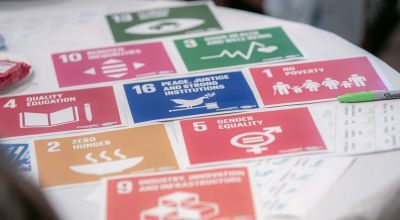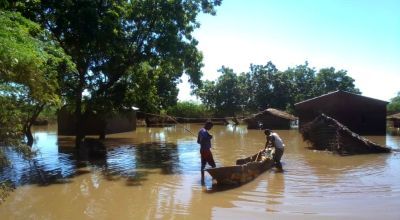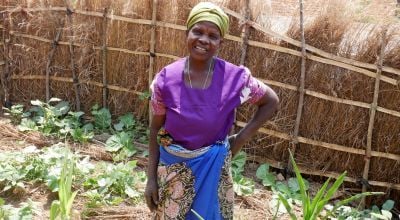
Read our 2023 annual report

Knowledge Hub
The Sustainable Development Goals. The Global Goals. Agenda 2030. They have many names, but one overarching aim - to end poverty, protect our planet, and achieve a better, fairer, and more sustainable future for all.
We are now seven years away from the deadline to achieve Agenda 2030, but unfortunately, we are not on track to meet all of the Sustainable Development Goals (SDGs) in time. That doesn’t mean that the world hasn’t made progress, or that we shouldn’t strive for more over the next seven years.
Here, we explain how the world came to adopt the SDGs, what exactly they are, and how Concern is working towards some of them in our work worldwide.
How the SDGs came to be
Back in the year 2000, the United Nations established eight Millennium Development Goals (MDGs) following the Millennium Summit. All of the UN member states agreed to attempt to achieve these eight international development goals by the year 2015. Each goal had its own targets, all with the aim to achieve each goal in 15 years.
However, after the deadline for the MDGs expired, the UN looked at what didn’t work with these goals, and found that while the MDGs focused on tackling poverty, hunger and inequality, they didn't address the root causes of those issues. Thus came a new agenda - the Sustainable Development Goals.
The United Nations General Assembly officially launched the Sustainable Development Goals in 2015, with 150 world leaders representing 193 countries committing to working towards the goals in their national policies. By expanding the eight MDGs to 17 SDGs, the new goals took the root causes of poverty into account as barriers to development that must be prioritised. And the overarching goal? To end global poverty by 2030.
What are the Sustainable Development Goals?
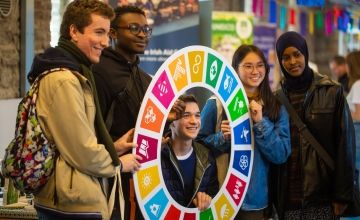
Agenda 2030 features 17 goals that aim to eradicate global poverty by the end of 2030. Under each of those goals is a group of targets and indicators - 169 targets that determine whether those goals are met, and several hundreds of indicators used to measure progress towards achieving the goals and targets.
Goal 1: End poverty
End poverty in all its forms, everywhere.
Goal 2: Zero hunger
Goal 3: Good health and wellbeing
Goal 4: Quality education
Goal 5: Gender equality
Goal 6: Clean water and sanitation
Goal 7: Affordable and clean energy
Goal 8: Decent work and economic growth
Goal 9: Industry, innovation and infrastructure
Goal 10: Reduced inequalities
Goal 11: Sustainable cities and communities
Goal 12: Responsible consumption and production
Goal 13: Climate action
Goal 14: Life below water
Goal 15: Life on land
Goal 16: Peace, justice and strong institutions
Goal 17: Partnership for the goals
Are we on track to meet the SDGs?
Despite a lot of progress over the past eight years, a combination of crises, climate change and conflict have affected the SDGs, impacting food, security, health, education and the environment, and the world is not on track to meet its targets by 2030.
In particular, the COVID-19 pandemic damaged and even reversed progress in eradicating poverty and hunger, improving health and education and providing basic services. A 2022 report from the UN found that the pandemic “wiped out more than four years of progress on poverty eradication and pushed 93 million more people into extreme poverty in 2020”. It also found that disruption in essential health services resulted in a drop of immunisation for the first time in a decade, and led to a rise in deaths from malaria and tuberculosis. Over 24 million students, from pre-primary to university level, saw their education disrupted and are at risk of never returning to school.
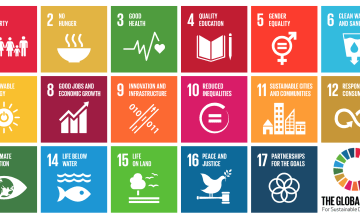
Meanwhile, conflicts including the crisis in Ukraine have contributed to over 100 million people being forcibly displaced worldwide, and a quarter of the world’s population living in conflict-affected countries. And as a population, we are nowhere near achieving the 1.5 °C target - in fact, global greenhouse gas emissions will need to decline by 43% by 2030 to avoid the worst impacts of climate change.
This all may sound like the SDGs are a lost cause - but think again. The UN has declared the 2020s the “Decade of Action” as we creep closer towards the SDG deadline. We can still continue to make progress towards the goals by tackling climate change, championing equality and education, and striving towards that all important zero poverty goal. Prior to the COVID-19 pandemic, the global poverty rate fell from 10.1% to 8.6%, showing that we can make progress when we unite to do so. With crises, climate and conflict making the global situation more difficult, we need a greater push to commit to the SDGs and the 2030 deadline.
Concern's work with the SDGs
While our current programmes don’t support all 17 Sustainable Development Goals, all of our programmes touch on at least one of the SDGs and their related indicators and targets. As well as this, all of our work is towards the larger goal of ending extreme poverty. Here are examples of Concern’s work intersecting with the Global Goals.
Goal 1: End poverty
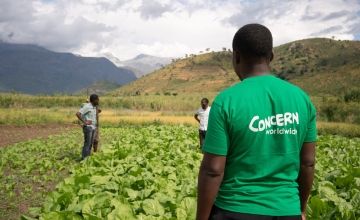
Our vision, our mission and our work are all defined by one goal – ending extreme poverty, whatever it takes. We believe that no-one should have to live in fear that they won't have a home to sleep in or enough food to feed their children. Our mission is to help those living in extreme poverty achieve major improvements in their lives which last and spread without ongoing support from Concern. To achieve this mission, we engage in long term development work, build resilience, respond to emergency situations, and seek to address the root causes of poverty through our development education and advocacy work.
Goal 2: Zero hunger
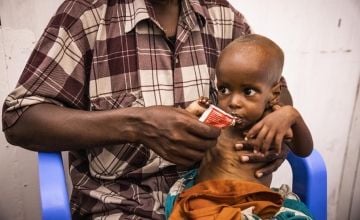
The goal of our health programmes is to contribute to the achievement of health and nutrition security for poor people. Our main objectives are to prevent under-nutrition and extreme hunger, strengthen maternal and child health, strengthen health facilities, and improve access to clean water and sanitation (which supports goal 6: clean water and sanitation). One facet of our health and nutrition programme is the approach known as Community Management of Acute Malnutrition (CMAM), which allows children suffering from malnutrition to be treated on an outpatient basis at clinics close to where they live. Since 2020, with the support of the EU-funded programme ERNE (Enhanced Responses to Nutrition Emergencies), over 82,400 children under five have been successfully treated for moderate or severe malnutrition through CMAM, and Concern has reached one million people with lifesaving health and nutrition services.
Goal 4: Quality education
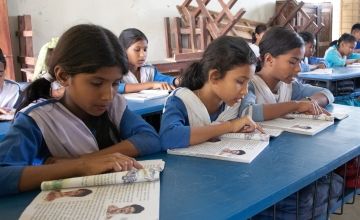
The goal of our education programme is to improve the lives of extremely poor children in a sustainable way, by increasing their access to quality primary education, improving school facilities, improving learning outcomes, and providing access to education for children in emergencies. For example, one of our programmes to improve access to free and quality education for conflict-affected children in the South West and Banadir regions of Somalia reached over 20,300 extremely vulnerable children in 2022. As well as providing safe learning spaces by constructing classrooms, we distributed recreational items such as footballs, jerseys and skipping ropes to facilitate social integration and tackle stress, and provided teaching and learning materials including copybooks and pencils to 1,500 of the most disadvantaged and poorest children to allow them to go to school without their families worrying about buying materials.
Goal 5: Gender equality
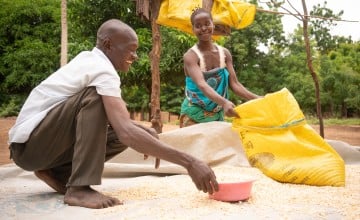
We specifically focus on gender equality as a means to significantly reduce inequalities and empower people living in extreme poverty to improve their lives. We provide opportunities for women to engage in business and vocational training, employment, education, leadership roles and savings schemes, thus increasing their sense of agency and empowerment. But it is just as important to engage men. Concern’s 'Engaging Men' projects, implemented across 16 countries from Sierra Leone to Lebanon, are a crucial aspect of our work on gender equality. These approaches create a safe space for couples, same sex groups and adolescents to discuss issues related to equality, and to address and tackle harmful stereotypes and gender roles.
Goal 6: Clean water and sanitation
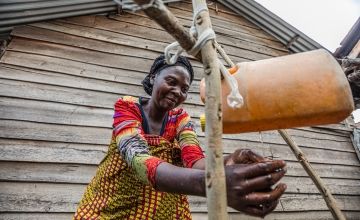
WASH (water, sanitation and hygiene) is a key part of Concern's programming. We aim to achieve significant and lasting improvements in the lives of programme participants through the establishment of a whole range of services including access to safe water, safe disposal of faeces, adoption of new hygiene behaviours and solid waste management. For example, in Bangladesh, we worked with community volunteers who raised awareness of families about good hygiene practices and helped them to access clean water and latrines. As a result, year-round access to safe drinking water reached 84% in 2022.
Goal 13: Climate action
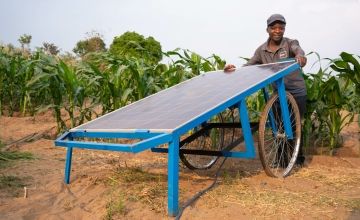
Many of the countries Concern works in are among the most vulnerable to climate change, yet they contribute the least to causing it. It is crucial that we adapt to climate change — that is, taking action to prepare for and adjust to the current effects of climate change and the predicted impacts in the future. Part of this is the promotion of Climate Smart Agriculture (CSA), which is a core part of Concern Worldwide’s resilience strategy across many of the countries in which we work. This type of conservation agriculture is a set of farming practices that helps people to get the highest possible yield from their crops in challenging weather conditions - from using organic fertiliser, to adopting new technologies, to growing more resilient crops.
How to support the SDGs
With world leaders and governments tasked with achieving the Global Goals, it can seem like a very daunting task to get involved yourself. But there are plenty of ways that you can localise the Global Goals and take small steps to make a change.
- Reduce your fast fashion consumption
- Reduce your food waste
- Shop locally
- Use public transport, cycle or walk to work to reduce your carbon footprint
- Write to your local representatives to engage with the SDGs
- Vote in local and national elections
- Support your favourite charity or NGO
- Speak out and stand up against against inequality, discrimination and harassment in the workplace or school
- Use solar energy wherever possible, and switch off your appliances at the sockets
- Compost and recycle at home and in work
- Raise awareness around key issues with your own campaigns in the workplace or on social media
Want to get even more engaged? Concern’s Project Us initiative is a unique forum where participants can engage with the SDGs and explore how issues at local level connect to the Global Goals.



